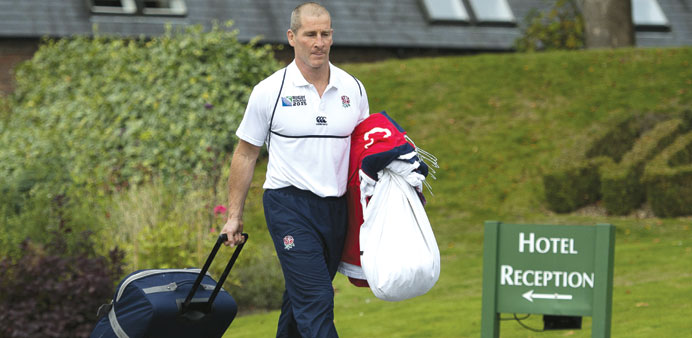A picture taken on October 11, 2015 shows England’s head coach Stuart Lancaster leaving the England team’s hotel following a press conference in Worsley, northern England on the morning after England’s final match of the 2015 Rugby Union World Cup. (AFP)
AFP/London
Stuart Lancaster carried the can for England’s woeful World Cup campaign when he stepped down as head coach yesterday.
Lancaster’s departure, three-and-a-half years after his appointment, was “by mutual consent”, according to a statement issued by England’s governing Rugby Football Union.
His exit was expected in the light of a World Cup which saw England become the first host nation to be eliminated in the group phase.
“I am obviously extremely saddened to finish the way we did in this World Cup and to step down from the role,” Lancaster said in the RFU statement.
“As I have always said, I ultimately accept and take responsibility for the team’s performance and we have not delivered the results we all hoped for during this tournament,” added Lancaster.
The 46-year-old won 28 of his 46 Tests in charge and took England to four successive second-place finishes in the Six Nations Championship without winning the title. However, this year’s World Cup was always his primary objective.
It proved a spectacular failure, with England crashing out following defeats by Wales and Australia, while Lancaster faced strong criticism for unsuccessful selection gambles such as his decision to place his faith in rugby league convert Sam Burgess.
But Lancaster, initially appointed on a caretaker basis after Martin Johnson quit following England’s quarter-final exit at the 2011 World Cup before taking on the job full-time, said the future was bright for a largely youthful England side.
“I took on the role in difficult circumstances and it has been a huge challenge to transition the team with many hurdles along the way,” explained Lancaster.
Genuine contenders
“We have played some excellent rugby and it was always going to be tough to get the right level of experience into them in time for 2015.
“It is a young group of players with the huge majority available for the Rugby World Cup in Japan in 2019, where I believe their recent experience will make them genuine contenders.”
When Lancaster first took over, he stressed his desire to “reconnect” the Test side with the grassroots of English rugby after a World Cup exit made worse by several embarrassing off-field incidents.
But former England fly-half Stuart Barnes was among those who said it was wrong to conflate off-field behaviour with the reasons why England, who last won the Six Nations under Johnson in 2011, were beaten in the quarter-finals by France.
Nevertheless after thanking players, staff and the RFU for their support, Lancaster said Wednesday: “Most of all, I would like to thank the England rugby fans...The team feels a close connection with everyone across the grassroots game, which has been important to us all.”
From the outset of Lancaster’s time as England coach, there were questions about whether the former Leeds rugby director and England Saxons (the national A side) had sufficient elite-level experience for the job.
And earlier this month, former Australia and Japan boss Eddie Jones said England had erred in having a “rookie coach” at the World Cup. “The Rugby World Cup was hugely disappointing for everyone associated with the England team and the subsequent review into the team’s performance was always intended to be extremely comprehensive, which it has been,” said RFU chief executive Ian Ritchie.
“Following the review, Stuart and I met, where we agreed that he should step down as head coach.”
Ritchie will now lead the search for Lancaster’s successor, which the RFU said would begin “immediately”.
However, Ritchie’s position is bound to be called into question given he both appointed Lancaster and last year gave the coach and his backroom staff six-year contract extensions taking them beyond the 2019 World Cup.
The RFU statement made no mention of assistant coaches Graham Rowntree, Andy Farrell and Mike Catt, who all now face an uncertain future.
England have never appointed an overseas coach but the likes of Montpellier’s Jake White, who guided his native South Africa to World Cup glory in 2007, Jones and current Wallaby boss Michael Cheika have all been linked with the role.

